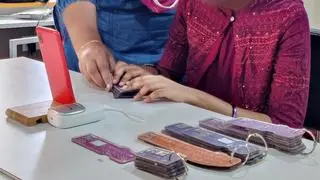An Indian start-up decided to announce its entry to a global audience in a unique way, with a short video of a ‘time traveller ghost’ who walks in and out of closed doors of a store. The video, which stumped people, went viral on YouTube and garnered over 3 million hits in record time, helping the Indian firm make a statement in the chaotic world of augmented reality.
A new technology, augmented reality (AR) has been blurring the line between what’s real and what’s computer-generated by enhancing what consumers see, hear, feel and smell. The current rage ‘Pokemon Go’ is an AR mobile game.
For Empower Labs, a Hyderabad-based gaming start-up, the ‘ghost’ video was a teaser for its AR game ‘Delta T’. “Our game is based on time travel, and would be the first AR creation from India that is in direct competition to Pokemon Go,” says Krishna Milan Rao, co-founder, Empower Labs.
Terming India “at the cusp of a gaming revolution with tech redefining our concept of gaming,” Rao says, “We are up against Pokemon Go developer Niantic Labs.”
Though CEO Rao is all of 24 years old, the team behind Empower Labs is a mix of young blood and seasoned veterans. Rao is helped by Karthik Chandra Isola, co-founder and COO. The tech team is led by Nelvin Joseph, co-founder and CTO, an entrepreneur himself, who built ‘Artin Dynamics’ a start-up that delves into Artificial Intelligence.
Looking for fundsThe company has raised ₹3 crore in seed funding for the game design, development, and beta launch and is looking for about ₹15 crore to take the game to market. Empower Labs’ MMO (massively multiplayer online) ‘Delta T’ integrates game-play, in-depth plot lines, and real world interaction. The game sets players in a dystopian future overrun by mega corporations, which endow their players with superhuman abilities and weaponry. The incorporation of real world maps into the game will ensure that players carry out tasks in the real world to progress in the game. The game looks at spawning an alternative lifestyle, and fostering gaming communities similar to those created by ‘Ingress’ and ‘Pokemon Go’.
Delta T stands for difference in time, hence the time-travel in the ‘ghost’ video.
With a major in Industrial Engineering and a minor in Entrepreneurship and Innovation from Purdue University, USA, Rao thought of the AR game in his final year in Purdue. “I came across ‘Ingress’, another game like ‘Pokemon Go’, which encourages you to work with a team,” says Rao, adding that ‘Ingress’ gave him a platform into AR and made him realise “that AR would be much bigger than Virtual Reality”.
Test bedsMobile Augmented Reality games are set to reach 420 million downloads annually by 2019, up from 30 million in 2014, according to Juniper Research, provider of analytical services. The MMO games market is estimated to grow to $12.8 billion in 2017, from $11.6 billion in 2015.
Since Australia, New Zealand and other countries have been test-beds for most AR games, Empower Labs’ Delta T game is set to have a beta launch in Australia and New Zealand. “We want to test our product there first before bringing it to India,” explains Rao.
The company hopes to monetise the game and is looking at in-app purchases, where brands can interact with Delta T gamers through strategic in-game placements.
“Since our game is placed in the real world, the gamer can interact with real brands. We are looking to incentivise interaction, and though one of the primary sources would be app purchases, we are placing weapons and artefacts in the game, which can be branded by real companies,” says Rao.
Pointing out that in-app purchases globally have crossed $2 million a day, Rao says, “Though we are looking at in-game branding, we need to understand what motivates players to buy these brands while gaming. For example, if we partner with Uber, we can incentivise our gamers to use Uber over rivals.”








Comments
Comments have to be in English, and in full sentences. They cannot be abusive or personal. Please abide by our community guidelines for posting your comments.
We have migrated to a new commenting platform. If you are already a registered user of TheHindu Businessline and logged in, you may continue to engage with our articles. If you do not have an account please register and login to post comments. Users can access their older comments by logging into their accounts on Vuukle.